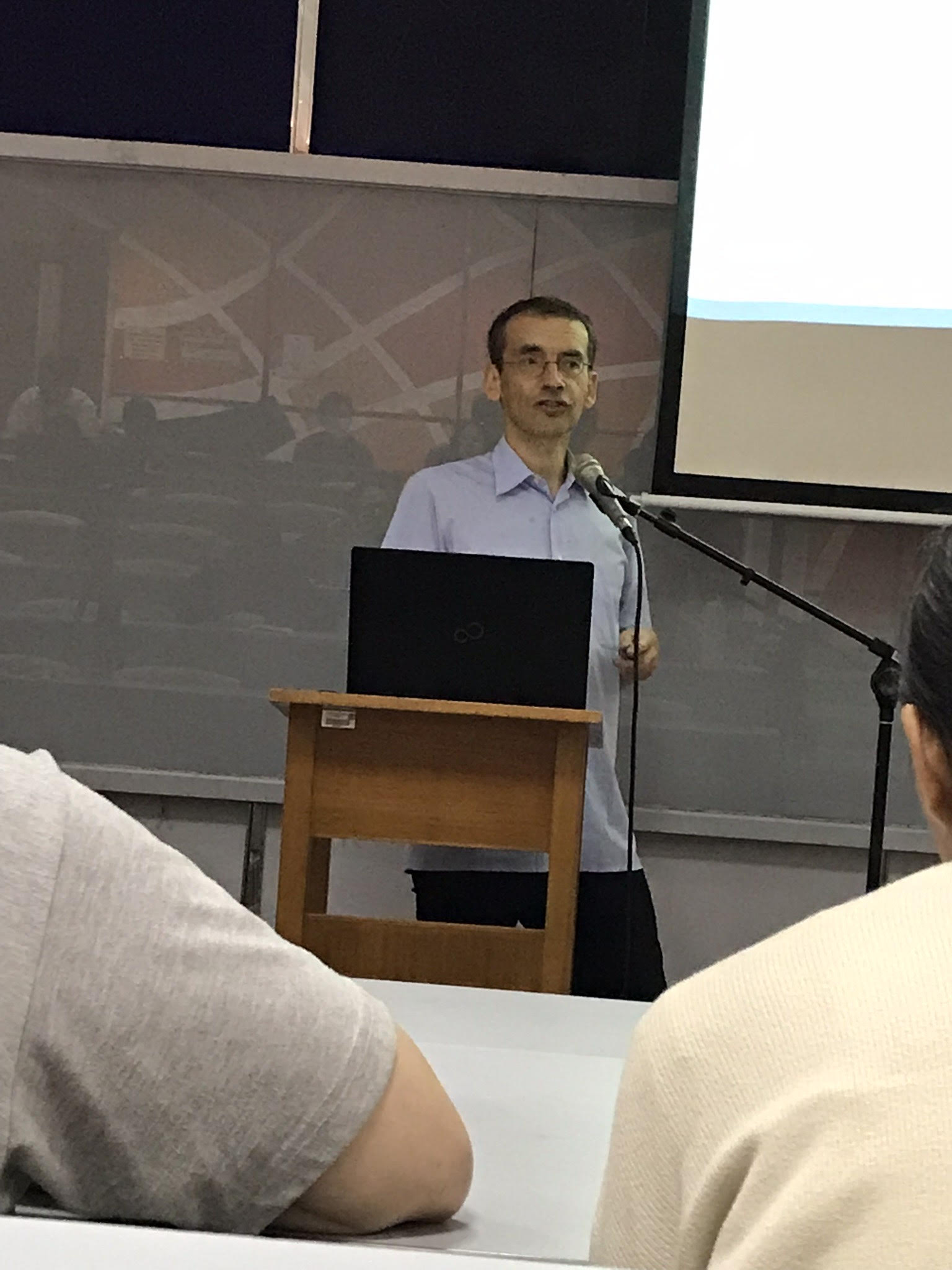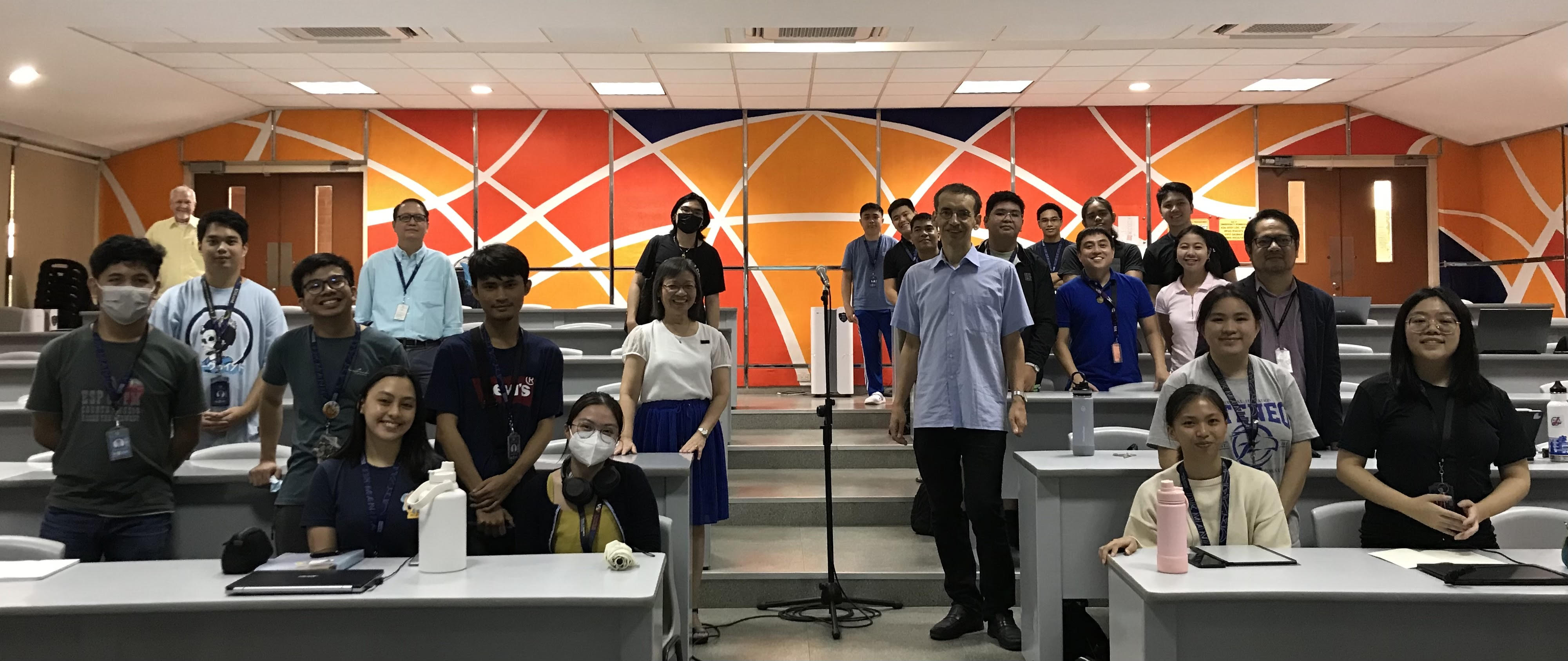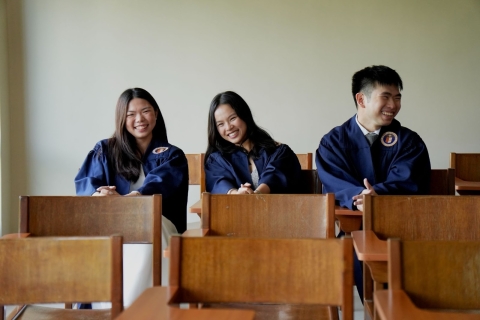Of infinities and continuities: Ruminations on mathematics
11 Aug 2024 | Kim Veranga (4 BS AMDSc)
It was a golden opportunity for the Department of Mathematics to have in its midst Bro Matthias Rugel, SJ, a philosopher and mathematician, who was given an Ethics course to teach for the Department of Philosophy last Intersession 2024. The Didactics of Mathematics Research Group (DiMRG) wasted no time and invited him to deliver two lectures.

Offered as part of the Mathematics Research Seminar Series, the first lecture entitled, ``The Existence of Many Infinities as Proof of Mind-Independence of Numbers,'' was about sets, counting, and the different types of infinities. This was held last 25 June 2024 before an eager audience consisting of mathematics students, philosophy majors, and faculty from both Departments of Mathematics and Philosophy. The chair of the Department of Philosophy, Dr Wilhelm PJ Strebel opened the program and introduced Bro Matthias.
The mathematics majors were delighted to hear a mathematician and philosopher ruminate about mathematical concepts such as cardinality and Cantor's paradise, and asking deep philosophical questions such as, ``What are numbers?" and why different infinities exist. Bro. Matthias began the first lecture with the question about counting: how do we connect something abstract to the concrete? He went on to say, “Numbers in a sense are consistent and exist only in the mind.” Given the physical finite world, he further asked where infinities in the concrete world might be found. The leap to infinity is not as far-fetched as one might think because although our mental capacities and physical entities are finite, these can well be infinite. There are mathematical entities that, by nature, are infinite such as counting, sets, and induction.

Although Bro Matthias was able to describe the concept of infinity, he quickly clarified that there exist different types of infinities. He showed using bijection that different sets have the same cardinality, then presented Cantor's famous diagonal argument to show that the real number line has a different, bigger cardinality compared to the natural numbers.
The seminar was a lively one as Bro Matthias gave opportunities for audience participation; he asked those in attendance what they thought about the topic and their feelings about it. In addition, he introduced “Five Minutes with your Neighbor” so that the audience could share their thoughts with their seatmates. An open forum followed his presentation.
In the open forum, the final question stood out: Can those infinite realities in mathematics support the realities of God? Bro Matthias’ answer was deep and profound and must be read verbatim:
You always objectify if you do mathematics, and you miss a very, very critical point – the inside of other persons, and your mental life and your emotions… if you speak only of half the reality -- the technical aspect, the structural aspect and skip all these emotions, inner feelings, then we [can’t] really speak about God! It’s infinite, it’s really deep, it’s high but if you want to speak about a reality that loves you, do something else… It’s only the “objective you” on something that is…God’s infinity includes qualities… and here we only have quantities. And the qualities are much more important for your daily life than quantities. You need the quantities for Physics, for calculations… but I would be cautious to bring this together with God. Because God includes other dimensions that are great. This dimension is also great but it’s not the God dimension – it’s not the only God dimension.
In the second talk, which was entitled, “The Impossibility of the Continuum: Why the Shot Arrow Never Moves,” Bro Matthias began by discussing the difference between being and becoming, in which the latter does not exist without the former. Then he started to introduce Zeno and the now infamous paradox where an arrow shot is considered motionless because time is divided into equal ``moments" and that the arrow is considered stationary per moment of time. This whole exposition of moments with the arrow gave rise to the infinitesimals and calculus which is really about small instances of time called differentials.
The last part of the second talk took a brief look at infinite sequences, particularly the argument that 1 does not equal 0.999… According to Bro Matthias, although 0.9999... is indeed smaller than 1, modern mathematicians have equated the two numbers, thanks to the invention of calculus and infinitesimals.
Bro Matthias concluded the seminar by providing some questions for the audience to ponder, specifically about how everything we might see may just be an illusion. As proposed by Zeno in ancient Greece, motion is not real and changes in position of an object are just results of differing moments in time. In the same manner, Bro Matthias asked whether what we see may or may not seem the way it is.
Both talks were delivered on-site and online and were well-attended. Readings for both talks were provided upon pre-registration. Following these successful talks is the possibility of offering an interdisciplinary elective course, Philosophy of Mathematics, which both mathematics majors and philosophy majors can enjoy.





